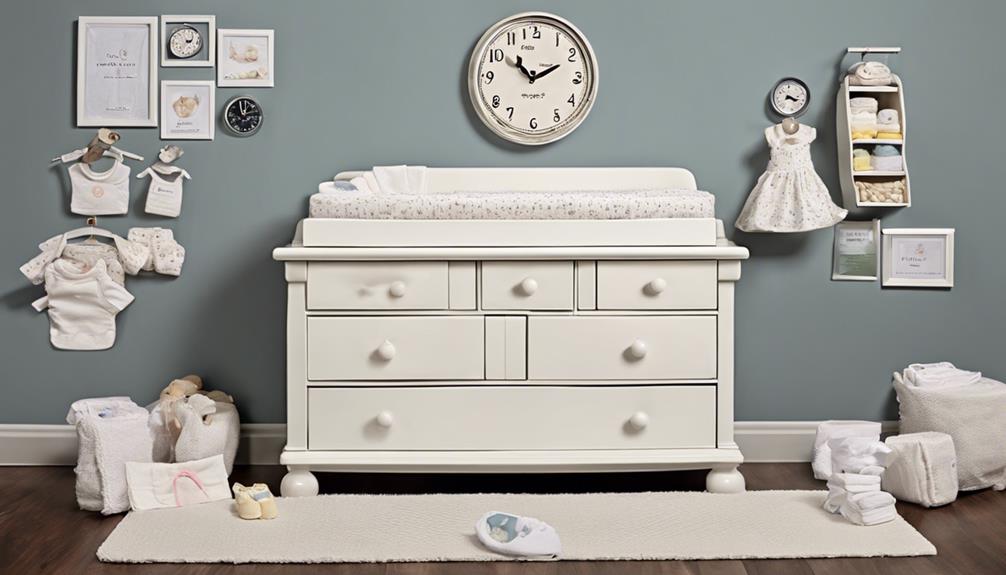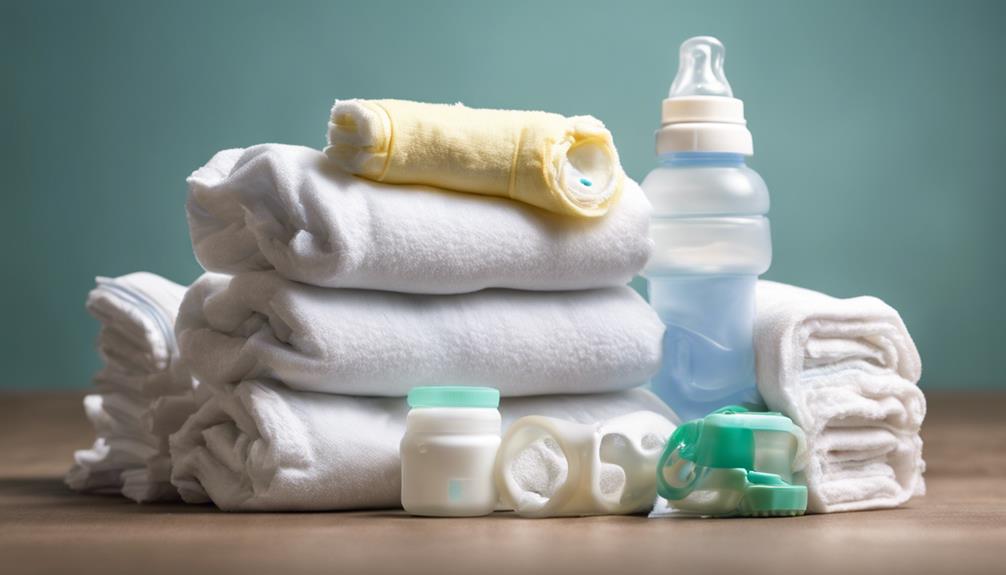Many parents ponder the precise number of poop diapers a newborn truly requires, especially when faced with the continuous cycle of diaper changes. Understanding the variations in bowel movements between breastfed and formula-fed infants can shed light on this matter.
However, the significance of monitoring these outputs goes beyond mere quantity, hinting at a deeper connection to the baby's well-being.
Let's explore the intricacies of newborn poop patterns and why it's more than just a dirty job.
Key Takeaways
- Newborns can have up to 6 or more poop diapers daily initially.
- Breastfed babies typically have more poop diapers than formula-fed infants.
- Monitoring dirty diaper frequency is vital for newborn health and nutrition.
- Changes in poop patterns should prompt discussion with a healthcare provider.
Average Number of Poop Diapers Daily
During the first six weeks of life, newborn babies can typically have up to 6 or more poop diapers daily on average. This frequency of bowel movements is a key indicator of a baby's health and digestive system functioning. For breastfed newborns, the number of poop diapers tends to be higher compared to formula-fed babies. Breastfed infants may have multiple bowel movements a day, sometimes after each feeding, leading to a higher average number of poop diapers.
On the other hand, formula-fed newborns usually have fewer bowel movements, ranging from 1-4 poop diapers per day, with stools that are typically larger.
Monitoring the average number of poop diapers daily is essential for parents and caregivers to guarantee their newborn is getting adequate nutrition and proper digestion. Any significant changes in the frequency of bowel movements should be promptly discussed with a healthcare provider to rule out any underlying issues and maintain the baby's well-being.
Factors Influencing Diaper Changes

Factors influencing diaper changes in newborns include the type of feeding method utilized, which can impact the frequency of diaper changes required. Monitoring wet diapers is essential to guarantee the baby remains adequately hydrated.
Diaper changes may escalate during growth spurts or when solid foods are introduced, affecting the newborn's health and nutrition intake. By keeping track of both wet and dirty diapers, parents can effectively gauge their newborn's well-being and ensure they're meeting their needs.
Understanding how feeding methods, growth spurts, and new dietary introductions can influence diaper changes is crucial for parents to provide optimal care for their newborn. By recognizing these factors, parents can adapt their diaper-changing routine to meet their baby's specific needs, promoting better health and comfort. Being attentive to these influences allows for a more informed approach to managing diaper changes and contributes to a better overall caregiving experience.
Monitoring Newborn Poop Patterns
To effectively monitor newborn poop patterns, parents should keep track of the frequency of dirty diapers in the first few days of their baby's life. Newborns should ideally have at least one dirty diaper a day during this time to indicate they're guaranteeing adequate nutrition and their bowels are functioning correctly. By monitoring diaper counts, parents can gain valuable insights into their newborn's poop patterns and make certain they're getting enough milk.
Additionally, around five wet diapers per day are expected by day five to assess hydration levels and overall health. Changes in the frequency of dirty diapers can sometimes signal feeding issues, so consulting a pediatrician is recommended for further guidance.
It's essential to pay attention to bowel movements as well, as a lack of bowel movements for more than five days could indicate underlying concerns that need to be handled promptly to guarantee the newborn's health and well-being.
When to Seek Medical Advice

Recognizing concerning changes in your newborn's poop patterns is important for prompt medical intervention and ensuring their health and well-being. As parents, it's vital to be vigilant and know when to seek medical advice regarding your newborn's poop.
Here are some key points to remember:
- Contact Healthcare Provider: If your newborn hasn't passed any stool in the first 24 hours, reaching out to a healthcare provider is essential.
- Consult Pediatrician for Constipation: Should your newborn go more than 4 days without pooping, it might indicate constipation, requiring consultation with a pediatrician.
- Immediate Attention for Color Changes: Any changes in poop color to black, white, or red should prompt immediate medical attention to rule out any concerning issues.
- Trust Parental Instincts: Always trust your instincts as a parent. If you notice any abnormalities in your newborn's poop frequency or consistency that raise concerns, seek medical advice promptly.
Tips for Managing Diaper Changes
After assuring your newborn's health by recognizing concerning changes in their poop patterns, it's important to focus on practical tips for managing diaper changes effectively. Babies typically require 8-12 diaper changes daily to maintain proper hygiene and comfort.
Promptly changing diapers after each poop can help prevent skin irritation and diaper rash. Using gentle wipes and applying diaper cream as needed can protect the baby's delicate skin during changes.
Keeping a stock of diapers, wipes, and disposal bags at designated changing stations can streamline the process and make sure you have everything you need at hand. It's critical to check for signs of leaks or discomfort to guarantee the baby stays clean and dry throughout the day.
Frequently Asked Questions
How Many Diapers Do You Need for a Newborn Poopy?
We typically change a newborn's diaper 6-8 times daily, including poopy ones. The frequency of poopy diapers can vary, especially between breastfed and formula-fed babies. Monitoring poops helps track health. Consulting a healthcare provider for guidance is essential.
How Many Poo Nappies Is Normal for a Newborn?
We observed that newborns typically have varying poop diaper frequencies. Breastfed babies may have 6 or more poop diapers daily, while formula-fed infants usually have 1-4. Monitoring these patterns is essential for tracking health.
Can a Newborn Have Too Many Poopy Diapers?
We noticed your concern about newborns having too many poopy diapers. Excessive poopy diapers, especially in breastfed babies, can indicate a healthy digestion and adequate milk intake. It's generally a positive sign of well-being.
How Many Times Should My Newborn Baby Poop in a Day?
We monitor newborns' poop frequency closely. Breastfed babies often go after feedings, up to 6 times a day. Formula-fed infants might have 1-4 larger stools. Lack of pooping for over a week warrants a healthcare provider's check.
Conclusion
To summarize, monitoring your newborn baby's poop diapers is essential for understanding their digestive health.
On average, breastfed babies may have up to six or more bowel movements a day, while formula-fed infants typically have 1-4.
Remember, changes in poop frequency or consistency can signal potential issues.
If you notice any concerning patterns or signs of discomfort in your baby, don't hesitate to seek medical advice.
Your baby's health and well-being are top priorities.








